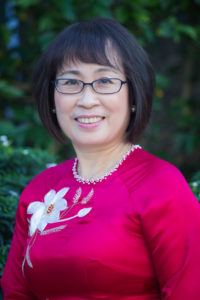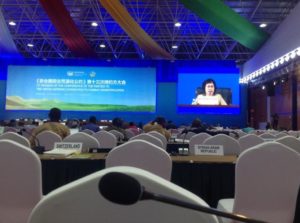Tap into the collective power of influential business and NGO pioneers to create new strategies and
tactics to build a more socially and environmentally conscious world.

Tap into the collective power of influential business and NGO pioneers to create new strategies and
tactics to build a more socially and environmentally conscious world.
Surname: Vu; First name: Hop; Middle name: Thi Bich
Company/NGO Name:
The Centre for Sustainable Rural Development (SRD)
Region, Country:
Vietnam

1. What is the mission of your company/NGO?
SRD is a foremost professional Vietnamese development agency that supports poor rural communities to adapt to the changing environment and sustainably manage their own livelihoods. Its success is underpinned by a holistic approach to development that ranges from grassroots capacity building to international advocacy.

Alternative livelihoods methods implemented by SRD have helped rural poor women in Vietnam to do System of Rice Intensification which is resilient to climate change.
2. What is the most innovative or environmentally/socially impactful project/practice your company/NGO has implemented?
Among nearly 70 projects SRD has been managed and implemented so far since 2006, we consider the project named “Towards a Sustainable livelihood of the Poor single women – headed household by applying climate-smart agriculture approach In Tinh Gia district, Thanh Hoa province, Vietnam” is one of the most socially impactful projects in terms of women’s empowerment and sustainable development.

Mrs. Vu Thi Bich Hop – Executive Director of SRD is discussing with local women to understand the root causes of their poverty issues.
3. How have those projects positively impacted the local community and/ or your country?
Through the above project’s implementation, SRD focuses on maximizing the economic opportunities for poor women farmers by working in the value chain to strengthen the connection between farmers and all related stakeholders, especially commercial food suppliers, which has been known as “the Public-Private-People Partnership (4Ps) approach”. The integration of the livelihood models into local socio-economic development plans have contributed significantly to sustainable development regarding both local resources and farmers household incomes.
4. Please share any new projects you will be implementing in the near future.
With the new SRD’s Strategic Plan (2018-2022) to come, we will focus on several key areas, including: Sustainable Agriculture and Livelihoods, Climate Change and Disaster Management, Biodiversity Conservation, Forest Management, and so on… In the meantime, we are working hard to promote livelihoods models which not only help local communities escaping poverty, but also reducing threats to biodiversity and reducing carbon emissions.
5. What are your top 3 career accomplishments?
Firstly, I have succeeded in developing and promoting SRD as the role model of Vietnamese CSO in challenging social and political context of Vietnam.
Secondly, I am happy with the contribution of my leadership to the development of two largest CSO networks in Vietnam, including: VNGO-FLEGT Network and VNGO&CC Network.
Thirdly, my long-term goal is to work with and work for the most vulnerable people, and it is good to notice that, SRD team and I have helped over 114.000 direct beneficiaries and 130.000 indirect beneficiaries at local communities to improve their lives sustainably.
6. What inspired you to choose your career path?
I am aware that a wide range of development issues, especially inequality and un-sustainability in rural development, can be much better solved with the engagement of civil social organisations. This realization has inspired me to work out for my long-term career goal as a leader and “change agent” with the aim of improving lives of the vulnerable people in Vietnam. More importantly, I also want to improve women’s participation in the workforce, and enhance women’s voice in decision making and leadership at all levels in order to bridge the gap of gender equality in Vietnam.

Mrs. Vu Thi Bich Hop – The only representative of CSOs in Vietnam to be invited by The United Nations Convention to Combat Desertification (UNCCD) to attend the 13th meeting of the Conference of the Parties to the UNCCD (COP 13 – UNCCD) organized in China, September 2017
7. Why do you care about sustainability? What is your story?
Sustainable rural development including economic, social and environmental is vital and plays an important role to all nations and Vietnam. Moreover, since Vietnam is a developing country and poverty eradication is the first priority of all stakeholders, SRD as a leading NGO has been working hard to support poor rural communities to adapt to the changing environment and sustainably manage their own livelihoods by applying a holistic approach to development, spanning from grassroots capacity building to international advocacy.
8. What is/are the biggest incentive(s) for businesses in your country to adopt sustainable practices?
I am not sure of the answer for this specific question. However, I can say that, at the moment, there is no clear mechanism nor tax exemption for converting/changing from traditional production to climate-friendly practices.
9. What is/are the biggest environmental or social challenge(s) facing your country today?
10. What is the most positive action your country has taken to positively impact its environment or social well-being?
Vietnam approved the Paris Agreement on Climate Change in 2016 and is now developing the Nationally Determined Contribution (NDC) and The National Adaptation Plan (NAP) which provide frameworks to all the sectors to develop with adaptation to CC and reduction of GHGs. Vietnam has also issued Green Growth Strategies (GGS) at National as well as at Provincial level which lay out the environmental conditions to economic development projects
Vietnam is on the way of shifting from a poor country to a mid-income country with positive achievements contributing to well-being improvement. Among them, Gender Equality Law is an advancement. Moreover, Child protection can be considered one of the most positive actions on which Vietnamese government has focused. Since Vietnam is the first Asian country and second in the world to ratify the Convention on the Rights of the Child, a number of laws, policies and legislation have been built and applied to protect the rights of children in Vietnam; and children with disabilities are among the target groups who have special cares from the supporting system.
Bonus Questions:
1. What are your thoughts on climate change? What is your company/organization doing to help bring awareness or to help mitigate climate change?
SRD has been working hard to deal with climate change’s issues through a wide range of interventions, for instance: leading the NGO network on climate change, implementing livelihood adaptation, disaster preparedness and emergency response capacity for communities at a grassroots level; capacity building for community-based NGOs to respond to climate change; and networking at national, regional, and international levels for advocacy, fundraising, and cooperation purposes.
2. What are the biggest challenges you have faced when pursuing or trying to promote sustainable practices/projects?
By history as a communist country, NGO is still a modest sector in Vietnam without much voice or influence. Given the small numbers of communities over the whole country with NGO support, our good and sustainable practices need very hard advocacy for government to review and up scale. Furthermore, secure funding is more and more difficult for NGOs in Vietnam as the government declared Vietnam to be the middle-income country, less and less development agencies from developed countries provide funding for NGOs. In the meantime, NGOs are not receiving funds from the government and Sustainable projects need comprehensive interventions for long-term impacts towards community development, we need to mobilize a stable financial resource in order to develop and implement project activities at different levels.
To learn more, please visit Center for Sustainable Rural Development on their website and social media:
SRD’s website: http://srd.org.vn/
SRD’s official Facebook page: https://www.facebook.com/srdvietnam/